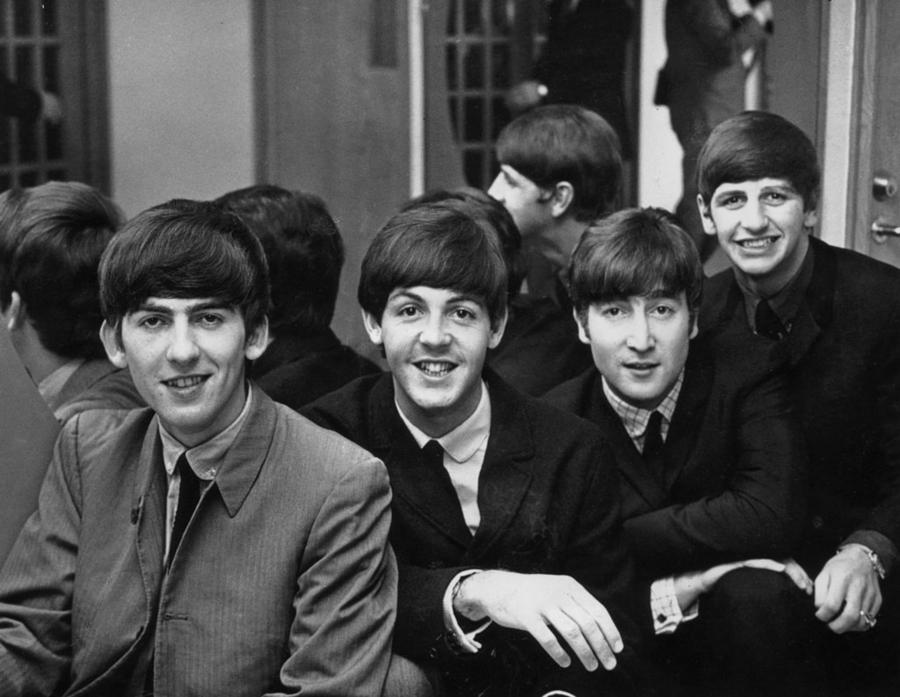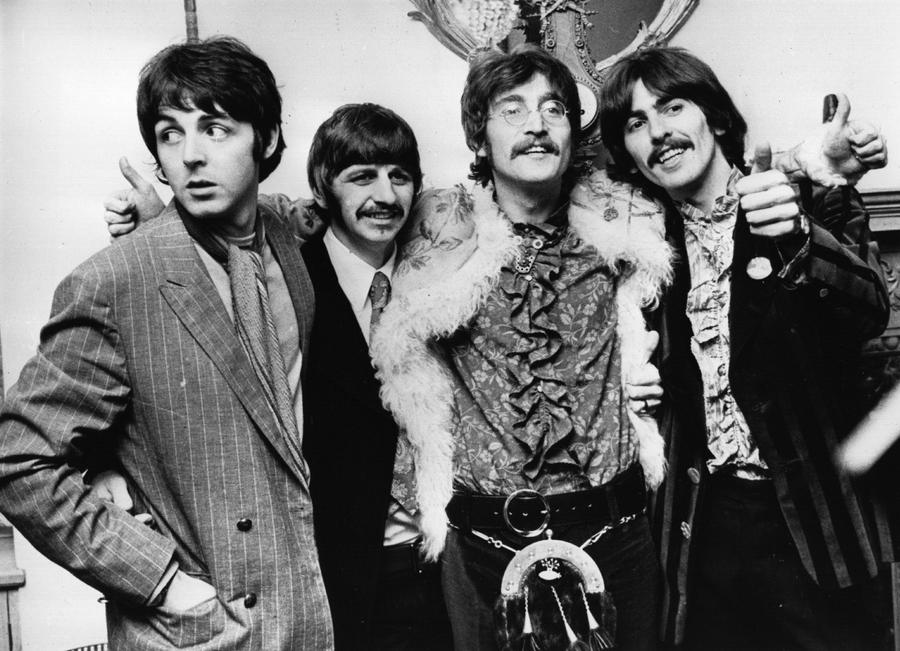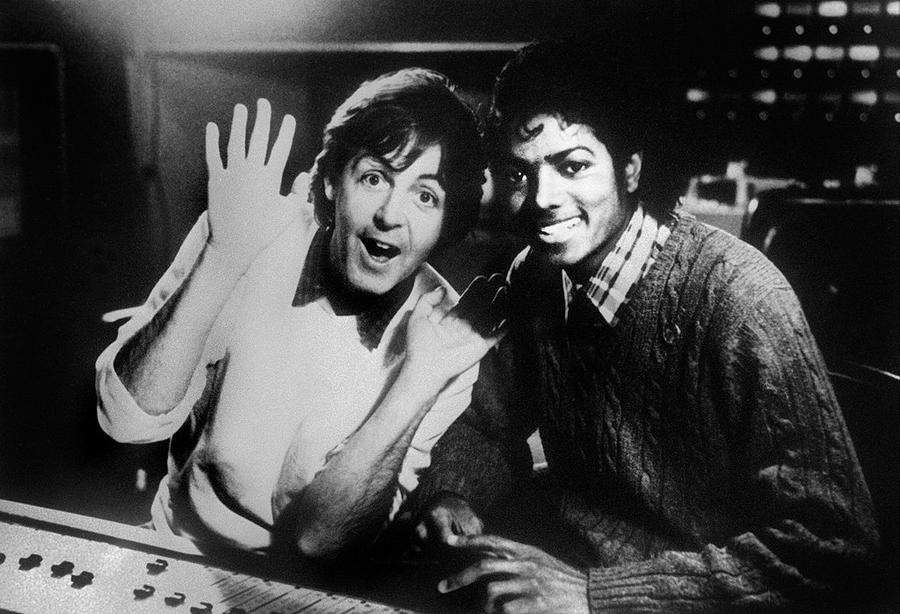In 1982, Michael Jackson flew to England to record the song “Say, Say, Say” with former Beatle Paul McCartney at the famous Abbey Road studio. This was the second musical collaboration between Paul and Michael, the first being 1981’s “The Girl is Mine,” which was featured on Jackson’s smash hit album Thriller. While working on “Say, Say, Say,” Paul invited Michael to stay with him and his wife, Linda, at their home in suburban London. One fateful night, after the three finished dinner, Paul took out a thick leather book and laid it out on the dining room table. This particular book listed every song and publishing right Paul had acquired over the previous 10 years. He made it clear to Michael that owning publishing rights was the only way to make REALLY big money in the music industry. Paul further bragged that in the last year alone, he had earned approximately $40 million from his music catalog:
“Every time someone records one of these songs, I get paid. Every time someone plays these songs on the radio, or in live performances, I get paid.”
Paul also clarified that none of those earnings came from Beatles songs because incredible as it may seem, he did not own them. Ironically, this free advice would come back to bite Paul in the butt two years later when Michael purchased the entire Beatles catalog for $47.5 million. Paul felt appropriately backstabbed, and his relationship with Michael was damaged forever. But how on earth did Paul McCartney and John Lennon lose ownership of The Beatles catalog in the first place??!!
Paul and Michael (AFP/Getty Images)
Young Lennon & McCartney Make a Terrible Business Decision
In February of 1963, exactly one year before The Beatles appeared on Ed Sullivan and Beatlemania swept the world, manager Brian Epstein suggested that John Lennon and Paul McCartney should form a company to protect their publishing rights. Because, at the time, The Beatles were still unknown, Epstein encouraged Lennon and McCartney to team up with an established publisher who could get their music to radio station managers and popular TV hosts around England. Epstein, Lennon, and McCartney soon signed with veteran publisher Dick James, who quickly secured The Beatles an appearance on the British pop show “Thank Your Lucky Stars.” In February 1963, Dick James assisted the 22-year-old Lennon and the 20-year-old McCartney in forming a company called Northern Songs. Northern Songs would be 50% owned by Dick James and his partner Charles Silver, 10% owned by Brian Epstein, 20% owned by Lennon and 20% owned by McCartney. Years later, McCartney would explain that they were just too young and naive to know that this was a terrible deal. They never even read the contract. Incredibly, McCartney also admitted that neither he nor John ever actually met Charles Silver.
Northern Songs now owned the copyright to 56 Beatles compositions and required that Lennon and McCartney produce a minimum of six new tracks per year until 1973. A month later, on March 22, 1963, The Beatles’ first album, “Please Please Me,” debuted in England. Two months later, the album reached #1 on the UK music charts, where it stayed for 30 weeks (when it was replaced by their second album, “With The Beatles”). Beatlemania quickly spread throughout the world, and all four band members became millionaires. And as The Beatles became rich, so did Brian Epstein, Dick James, and Charles Silver.
In 1965, Dick James and Charles Silver discovered that Northern Songs could avoid a rather large capital gains tax bill by becoming a public company. When Northern Songs was listed on the London Stock Exchange, Lennon and McCartney were each left with a 15% stake that was worth $320,000 ($2.3 million in modern dollars). James and Silver still controlled 37.5% of the company worth $800,000 ($6 million today).

Keystone/Getty Images
Selling Out
In August of 1967, after Brian Epstein died of a drug overdose, Lennon and McCartney tried unsuccessfully to wrestle control of their songs away from Dick James and Charles Silver. James and Silver were so offended by the attempted coup, they sold their entire stake to a company called ATV Music Publishing for $2.5 million ($17 million in today’s dollars). They didn’t even bother to inform Lennon or McCartney. In fact, John found out about the sale from a newspaper headline while he was honeymooning with Yoko Ono. ATV was now the majority owner of 88 classic Beatles songs that had been covered by nearly 3,000 different artists to date.
Paul and John still would earn 25 cents each for every dollar ATV earned from their songs, but that was a relative pittance compared to what they most likely deserved. As a consolation, ATV offered to buy out the remaining rights for $14.755 million ($100 million in today’s dollars), but Lennon and McCartney refused. The duo then unsuccessfully tried to rally a group of investors to purchase ATV in a hostile takeover. To make matters worse, Lennon and McCartney were still obligated to write six new songs for ATV until 1973. Exasperated, in 1969 The Beatles agreed to sell their remaining rights to ATV for $5.738 million ($36 million today) with the stipulation that they be released from their contract immediately.

John Pratt/Keystone/Getty Images
1969-1984: Another Blown Shot
Ownership of The Beatles catalog would remain unchanged from 1969 to 1981 when ATV was sold to an Australian business tycoon named Robert Holmes à Court. Prior to the sale, McCartney had the opportunity to purchase the catalog from ATV for $40 million. He approached Yoko Ono to see if she wanted to split the cost, but she insisted the catalog wasn’t worth more than $20 million, so they eventually declined. To his credit, at the time, McCartney was personally worth hundreds of millions of dollars and could have bought the catalog outright himself, but he feared that buying the songs on his own would make him look greedy and disrespectful of John Lennon’s legacy.
Michael Jackson Makes A Move
Robert Holmes à Court was not interested in owning ATV music for the long term. He immediately fired almost every ATV employee and announced that the music side of the business was up for sale. In 1984, McCartney was again given the right to make the first offer on the catalog, but by now, he made it clear he was not interested because he thought it was “too pricey.” Around this same time, Michael Jackson’s longtime lawyer, John Branca, got wind that ATV was for sale. Ever since his fateful dinner with McCartney two years earlier, Jackson had been on a publishing rights buying spree. When he heard ATV Music was for sale, Michael instructed John Branca to spend whatever it took to acquire The Beatles catalog…
To find out how Michael Jackson bought The Beatles catalog and then turned it into a billion-dollar music empire, click the following link for part two of this story!
Part 2: How Michael Jackson Built A Billion Dollar Music Empire
U.S. Copyright Law Opens a Path for McCartney
U.S. copyright law provided Paul McCartney an opportunity to reclaim ownership of his share of The Beatles’ songs after a set period. The Copyright Act of 1976 allows songwriters to recapture publishing rights 56 years after publication for songs created before 1978. For McCartney, that meant Beatles compositions from 1962 would become eligible in 2018 (56 years after their release), and songs written in 1970 would be eligible by 2026. In practical terms, this law gave McCartney a chance to “get back” his rights in the U.S. once the original copyright term expired. He began preparing early: as far back as 2008, McCartney started filing formal termination notices with the U.S. Copyright Office to reclaim dozens of Beatles songs as soon as they hit the 56-year mark. By 2015, he had filed to reclaim at least 32 Lennon–McCartney titles (with the first eligible song being “Love Me Do,” released in 1962).
However, reclaiming these rights was not straightforward worldwide. Notably, British courts ruled that U.S. termination rights do not apply in the U.K. (as seen in a case involving the band Duran Duran), which complicated McCartney’s attempts to regain global rights. This set the stage for a legal showdown in the United States, where McCartney’s claims under U.S. law would be tested.
McCartney’s Legal Battle and 2017 Settlement
In January 2017, Paul McCartney filed a lawsuit in a U.S. federal court against Sony/ATV to affirm that his U.S. termination notices would indeed restore his copyrights as of their effective dates. He sought a declaratory judgment to ensure that by the time 2018 arrived, he would regain ownership of his songs, avoiding any attempt by the publisher to block the reversion. McCartney was wary because of the recent Duran Duran case and wanted to preempt any refusal by Sony to honor the U.S. law.
After several months, the dispute never reached a trial. In June 2017, McCartney and Sony/ATV reached a private settlement, avoiding a high-profile courtroom battle. The details of the agreement were confidential, but McCartney’s attorney confirmed that the parties “resolved the matter” and the lawsuit was dismissed. This settlement presumably ensured that McCartney would receive the rights to his songs as they reverted in the U.S., without further legal conflict. Industry observers noted that both sides had much to lose (Sony risked a precedent of losing valuable catalogs, and McCartney risked delays), so a mutually agreeable deal was struck in the end. The settlement was hailed as a major victory for McCartney, effectively ending a decades-long quest to reclaim his own music.
Who Controls and Benefits from The Beatles’ Songs Today?
Paul McCartney has indeed succeeded in regaining ownership of significant portions of The Beatles’ publishing rights – at least in the United States. Following the 2017 settlement and the timetable of U.S. copyright expirations, McCartney’s company MPL Communications now holds the U.S. publishing rights to the songs he wrote (or co-wrote) with John Lennon, once those songs reach 56 years since publication. For example, McCartney’s share of early hits like “Love Me Do” reverted to him in October 2018, and each year more songs have reverted (e.g. 1963 compositions in 2019, and so on). By 2026, the U.S. rights to the entire Lennon–McCartney Beatles catalog (through Let It Be) will have reverted to the songwriters (or their estates) under this law. In practical terms, McCartney now directly benefits from these U.S. publishing rights – he can collect the publisher’s share of royalties and control licensing of those songs in the U.S., through MPL (which administers his recovered copyrights). This marks a dramatic change from the past decades when The Beatles received songwriting royalties but “lost out on a massive windfall” from publishing and licensing, which went to whoever owned the catalog at the time.
Globally, Sony Music Publishing remains a key stakeholder. Sony still controls the publishing rights outside the United States for the Lennon–McCartney songs. The private settlement and U.S. law did not undo Sony’s ownership in other countries, so Sony continues to administer and profit from the Beatles catalog internationally. In addition, John Lennon’s share of the catalog’s publishing has largely remained with Sony. Lennon’s estate (Yoko Ono) had the option to reclaim his portion of the rights earlier – since Lennon died in 1980, U.S. law allowed his heirs to recapture his song rights as early as the 1990s. Instead, Yoko Ono agreed to a deal that let Sony/ATV retain the publisher’s share of Lennon’s songs for the life of the copyright. This arrangement means Sony (now Sony Music Publishing) continues to control Lennon’s portion of the publishing, likely in exchange for ongoing royalty payments to Lennon’s estate. In fact, Ono is expected to retain control over Lennon’s royalties but Sony holds the publishing ownership until those copyrights eventually expire around 2050.
Other stakeholders have a smaller role. Michael Jackson’s estate no longer has any stake in The Beatles’ songs, as it sold its rights entirely to Sony in 2016. The estates of George Harrison and the still-living Ringo Starr were never in the same position regarding the Lennon–McCartney catalog – Harrison’s own compositions (published under his Harrisongs company after 1968) and Starr’s few songwriting contributions were handled separately. They continue to receive royalties from their own Beatles songs, but those songs are generally administered by other publishers and were not part of the ATV/Sony catalog that McCartney has fought over.

